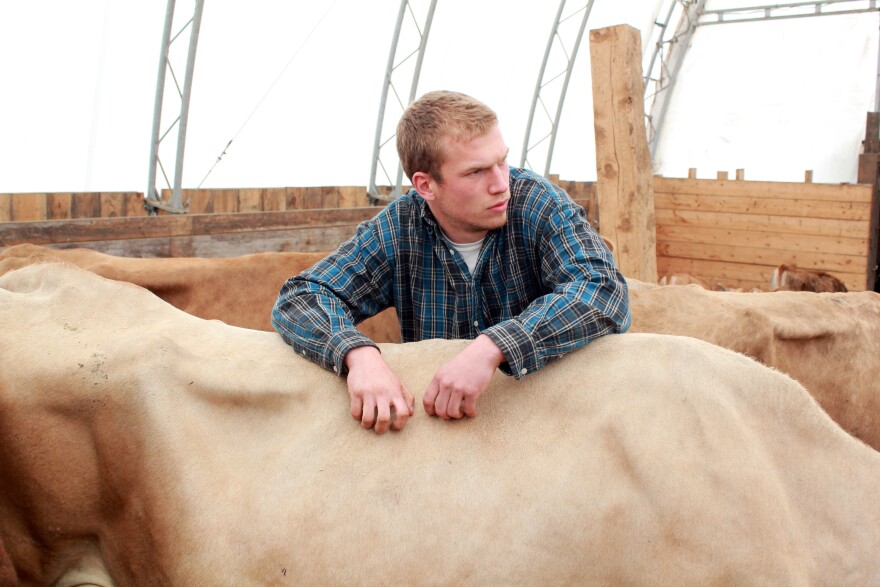A new program in the agricultural community will roll out this month. It's a workplace wellness program for farmers. The MassGrownWellness program offers in-person and online mental health training. Ashley Randle, the Deputy Commissioner of the Massachusetts Department of Agricultural Resources, describes who some of the people who will get trained are.
Ashley Randle, MDAR: A lot of our staff work directly in the field with farmers, whether it's in our agricultural preservation restriction program - they're meeting with farmers, they're working close on farmland. We also have inspectors that are in the field, and then we have all our staff members that answer calls and work with the farming community in their various capacities.
But then, when it comes to our stakeholder organizations, we really have a diverse group. We have local organizations across the state, over ten of those. We also have veterinarians, seed salesmen, depending on the type of agricultural activity that's taking place. There are numerous stakeholders that are engaging with farmers daily.
And with this program, we really want to make sure that they feel equipped, should there be a mental health issue that a farmer raises with them… to be able to respond to that and have the tools in their toolkit to know how to assist the farmer.
Carrie Healy, NEPM: One of the stakeholder groups you mentioned that could take part in this training, were veterinarians. They hold the highest rate of suicide across any civilian profession in the U.S. Will this program in any way address veterinarians themselves needing some of the same tools that they'll be trained to offer to farmers?
Yes. Vermont Farm First, in our initial conversations, had mentioned that… because one of the industries that brought about their program was the dairy industry in Vermont, (which is a significant industry for agriculture) and the veterinarians that work with the dairy farming community. When there was the significant dairy crisis, back in the eighties and early nineties, that was when Vermont Farm First developed their program to help assist dairy farmers. And certainly, an offshoot of that connection is veterinarians work closely with our livestock producers. So, when we were looking to develop our program, we looked at the broad spectrum of stakeholders who support our farmers. And certainly, veterinarians were one of the ones that rose to the top of our list. So, through these trainings, understanding the unique challenges and needs of veterinarians, we're hoping to address those through our stakeholder trainings.
What kind of training is this? What will it entail?
Through our grant, we've been able to contract with Vermont Farm First, and they've really been engaged in this work for several years and have extensive training and working specifically with the agricultural community will be hosting in-person and virtual trainings across the state to make sure that all members of the food community and agricultural community are served. These trainings will help equip both the stakeholders and farmers with ways to cope with stress, how to manage stressful situations, emphasize self-care, and how to really take the time to address their mental health needs.
As we know, agriculture is a very stressful occupation and we want to make sure that the farmers have these tools through the trainings to be able to self-identify stressors on the farm or external factors and how they can cope with those and best manage them. So, the trainings will really help in those areas. And from these initial trainings which will be held January through March across the state, we're hoping to then develop further trainings to provide support.
Can you describe what some on farm stressors could be for farmers on any given day?
Over the past few years, the COVID-19 pandemic was a major stressor, as many of our farms lost their retail markets and they had to quickly adapt and pivot their operations to either find new markets or new ways to get their food produced to the consumer. And we know that food insecurity levels were at their highest at the height of the pandemic, with one in three people now being food insecure. And so, for many farmers, they felt the weight of that and they wanted to help their communities and respond.
In addition to that, we've had extreme weather events. The last year we had a very wet growing season and then this year we had a significant drought. So weather is certainly a big factor.
Also, costs of production with the war in Ukraine and inflation, many of the on-farm inputs feed for livestock, fertilizer, any of those inputs have seen significant price increases. So, farmers are also trying to deal with that while managing their herds or trying to grow their crops throughout the year.
So, there are several factors as well as the long days. Farming is 365 days a year and sometimes you can’t have as much family time. I've seen that firsthand. I come from a dairy farm background and just knowing that you must take care of the livestock every single day and that's your number one priority. Sometimes you don't get to have those family activities that others may be able to enjoy. So, there's many factors that can be stressful to our farmers.
Where do people go to learn about when the trainings are being held?
So, if they go to mass.gov and they search agricultural, community, mental health and wellness program trainings, they'll be able to find a list of both the in-person and virtual trainings and sign up for those right on our website.
If you’re experiencing a mental health crisis, or you’re helping someone in crisis, you can reach out for help — by calling or texting 9-8-8.






